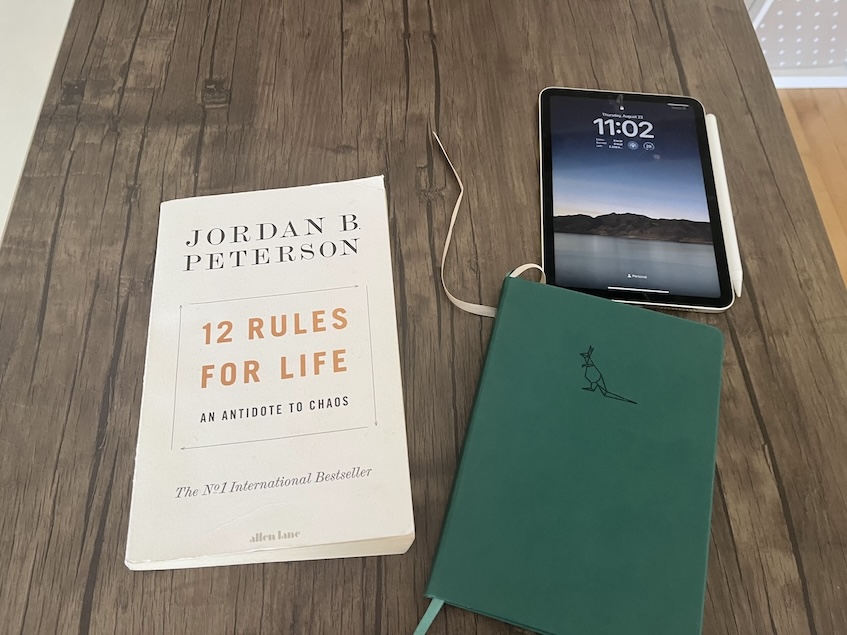Book Summary: 12 Rules for Life: An Antidote to Chaos
A masterpiece book that offers practical advice for living a meaningful, responsible, and disciplined life.

“Success is not final, failure is not fatal: It is the courage to continue that counts.”
— Winston Churchill
12 Rules for Life: An Antidote to Chaos by Jordan B. Peterson is a best-selling self-help book that offers practical advice for leading a meaningful and disciplined life. Drawing on psychology, philosophy, mythology, and religion, Peterson presents 12 rules that serve as guidelines for navigating the complexities of life. Each rule is accompanied by deep reflections on human nature, behavior, and the consequences of living in both order and chaos.
Overview of the 12 Rules
Rule 1: Stand Up Straight with Your Shoulders Back
Peterson begins by emphasizing the importance of posture, both physically and psychologically. Standing up straight with your shoulders back is a metaphor for taking responsibility for your life and confronting the challenges that come your way. By adopting a confident posture, you signal to yourself and others that you are capable and willing to assert yourself. This rule is rooted in the idea that our body language can influence our mindset, leading to increased confidence and a greater sense of control over our lives.
Rule 2: Treat Yourself Like Someone You Are Responsible for Helping
Peterson argues that many people take better care of others than they do of themselves. This rule encourages self-compassion and self-care, urging individuals to treat themselves with the same care and attention they would offer to someone they love. The idea is to recognize your own worth and take responsibility for your well-being, which is essential for personal growth and fulfillment.
Rule 3: Make Friends with People Who Want the Best for You
The people you surround yourself with have a significant impact on your life. Peterson advises choosing friends who support your growth, challenge you to be better, and genuinely care about your well-being. Associating with positive influences helps you avoid the pitfalls of negativity and encourages you to pursue your goals with greater confidence and clarity.
Rule 4: Compare Yourself to Who You Were Yesterday, Not to Who Someone Else Is Today
In an age of social media and constant comparison, this rule encourages focusing on personal progress rather than comparing yourself to others. Peterson suggests that the only meaningful comparison is with your past self. By evaluating your progress and striving to be better each day, you can cultivate a sense of purpose and avoid the negative emotions that come from unrealistic comparisons.
Rule 5: Do Not Let Your Children Do Anything That Makes You Dislike Them
Peterson emphasizes the importance of discipline and boundaries in parenting. He argues that parents should not allow their children to behave in ways that provoke negative reactions from others or themselves. By setting clear rules and consequences, parents can guide their children towards becoming responsible, well-adjusted adults. This rule is about teaching children the social skills and behaviors necessary for successful integration into society.
Rule 6: Set Your House in Perfect Order Before You Criticize the World
This rule advocates for personal responsibility and self-improvement before attempting to change the world. Peterson suggests that before criticizing external circumstances or others, you should focus on putting your own life in order. This includes addressing personal faults, cleaning up your living space, and taking care of your responsibilities. By doing so, you build the foundation for a more meaningful and effective engagement with the world.
Rule 7: Pursue What Is Meaningful (Not What Is Expedient)
Peterson encourages readers to pursue long-term meaning rather than short-term gratification. He argues that true fulfillment comes from engaging in activities and goals that align with your values and contribute to the greater good. This rule is about understanding the importance of sacrifice, discipline, and responsibility in achieving a meaningful life, rather than taking the easy way out for immediate pleasure.
Rule 8: Tell the Truth – Or, at Least, Don’t Lie
Honesty is a central theme in Peterson’s philosophy. He stresses the importance of telling the truth, both to yourself and to others. Lying, he argues, distorts reality and undermines trust, leading to chaos and suffering. By committing to honesty, you align yourself with reality, build trust in relationships, and avoid the negative consequences that come from deceit.
Rule 9: Assume That the Person You Are Listening to Might Know Something You Don’t
Effective communication involves listening with the intent to understand, not just to respond. Peterson advises approaching conversations with humility and openness, assuming that others may have knowledge or perspectives that you lack. This rule fosters better relationships, deeper understanding, and the opportunity to learn and grow through meaningful dialogue.
Rule 10: Be Precise in Your Speech
Clarity in communication is essential for avoiding misunderstandings and resolving conflicts. Peterson advocates for precision in speech, which involves being clear and specific about your thoughts, feelings, and desires. By articulating your needs and intentions accurately, you reduce the likelihood of confusion and ensure that others understand your perspective.
Rule 11: Do Not Bother Children When They Are Skateboarding
This rule is a metaphor for encouraging risk-taking and resilience, particularly in children. Peterson argues that overprotecting children can stifle their development and prevent them from learning how to navigate challenges. He believes that allowing children to take risks and face difficulties is essential for building strength, courage, and independence.
Rule 12: Pet a Cat When You Encounter One on the Street
This final rule is about finding moments of peace and joy in the midst of life’s hardships. Peterson suggests that when life becomes overwhelming, it’s important to take a step back and appreciate the small, beautiful moments that offer solace. Petting a cat, or any similar simple pleasure, symbolizes the need to find balance and tranquility amidst chaos.
Themes and Philosophical Underpinnings
Order vs. Chaos
One of the central themes in 12 Rules for Life is the balance between order and chaos. Peterson describes order as the structure and stability that allow us to function in society, while chaos represents the unknown and unpredictable aspects of life. The book emphasizes the importance of navigating between these two forces, seeking to establish order in our lives without becoming rigid, and embracing the challenges of chaos without being overwhelmed.
Responsibility and Meaning
Peterson advocates for taking responsibility for your life as a path to finding meaning. He argues that meaning is derived from accepting the burdens of existence and striving to improve yourself and the world around you. By taking responsibility, you create a life that is purposeful and fulfilling, rather than one that is driven by nihilism or resentment.
The Power of Myth and Religion
Throughout the book, Peterson draws on myths, religious stories, and psychological theories to illustrate his points. He believes that these narratives contain deep truths about human nature and the structure of reality. By understanding and integrating these stories, we can gain insights into our own lives and the challenges we face.
Criticisms and Controversies
12 Rules for Life has been both praised and criticized. Supporters appreciate Peterson’s emphasis on personal responsibility, his insights into human behavior, and his practical advice. Critics, however, argue that some of Peterson’s ideas are overly simplistic, rooted in traditional gender roles, or presented in a dogmatic manner. Additionally, Peterson’s discussions of political and cultural issues have sparked controversy, with some accusing him of promoting conservative or reactionary viewpoints.
Conclusion
12 Rules for Life: An Antidote to Chaos offers readers a set of principles for living a disciplined, responsible, and meaningful life. Jordan Peterson’s rules are grounded in a deep understanding of human nature and are designed to help individuals navigate the complexities of modern life. Whether you agree with all of his views or not, the book provides thought-provoking insights and practical advice for those seeking to improve themselves and their lives.
By following these 12 rules, Peterson suggests that individuals can bring more order into their lives, confront chaos with courage, and ultimately find a sense of meaning and purpose. The book serves as both a guide for personal growth and a reflection on the challenges of being human in a complex world.
This summary provides an overview of the key concepts, themes, and philosophical underpinnings of 12 Rules for Life. Whether you’re new to Jordan Peterson’s work or looking to deepen your understanding, this summary captures the essence of his teachings and the practical advice offered in the book.
Click here to read reviews and purchase the book.




